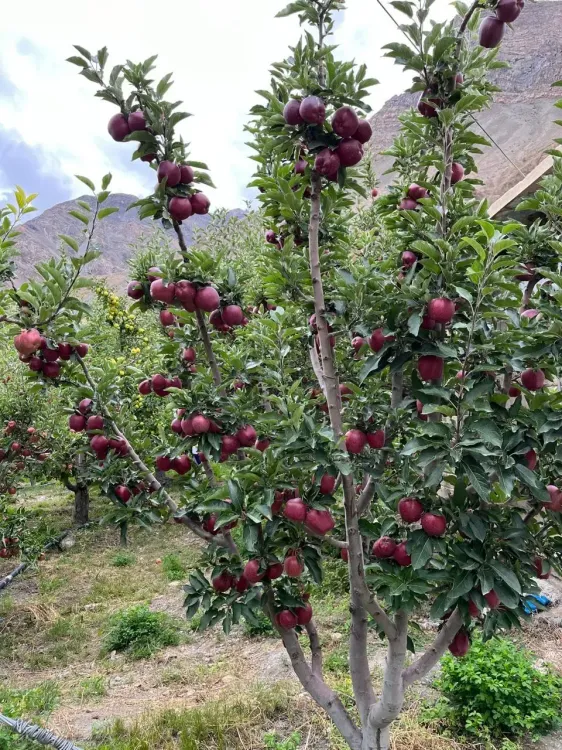Why Are Pesticide-Free Apples from Himachal Pradesh's Spiti Fetching High Prices?

Synopsis
Key Takeaways
- Higher Firmness: Apples from Spiti demonstrate 13% greater firmness.
- Natural Inputs: Grown without synthetic fertilizers or pesticides.
- Soil Improvement: Organic carbon levels are higher in natural orchards.
- Market Success: Farmers report better prices for naturally grown apples.
- Yearly Testing: Fruits are tested for chemical residues annually.
Tabo (Himachal Pradesh), Oct 14 (NationPress) Apples cultivated in the pristine environment of Himachal Pradesh's Spiti Valley—free from synthetic pesticides and fertilizers—are achieving considerably higher market prices. This is attributed to their 13 percent greater firmness compared to those from standard orchards, according to officials from the university.
The apples, grown entirely through natural farming practices, were auctioned separately for the first time, as reported by the Krishi Vigyan Kendra of Dr Y.S. Parmar University of Horticulture and Forestry (UHF) located in Nauni, Solan district.
Situated in Tabo within the Lahaul and Spiti district, the apple orchard—a cold desert region adorned with small helmets across the Himalayan peaks—yielded an impressive Rs 9 lakh during the auction for a 1,100 sq m plot.
The orchard consists of 120 apple trees of various varieties, grown without any synthetic fertilizers or pesticides. Instead, natural solutions like cow dung, cow urine, and locally sourced plant mixtures were utilized to enhance soil fertility and manage pests and diseases.
Apples from natural farming practices in the Spiti Valley are showcasing remarkable quality indicators.
These fruits, cultivated without chemical inputs, demonstrated 13 percent higher firmness than their conventionally grown counterparts, indicating better texture and extended shelf life.
Moreover, they recorded a total soluble solids (TSS) level that is 11 percent higher than that of traditionally grown apples, a vital marker of sweetness and consumer appeal.
Additionally, the soil organic carbon content in the natural farming orchard reached 2.79 percent, surpassing the 2 percent found in conventional orchards, signifying an enhancement in soil quality.
Farmers engaging in natural farming techniques report longer shelf life, improved flavor, and premium market rates compared to conventionally produced apples, stated the university.
R.S. Spehia, the head of Krishi Vigyan Kendra in Tabo, mentioned that the orchard transitioned to natural farming practices in 2020.
Providing insights, Inder Dev, Director of Extension Education, noted that the natural farming block in Tabo currently holds a two-star rating under the CETARA certification by the state government.
Efforts are in progress to secure a three-star rating. The university’s Vice-Chancellor, Rajeshwar Singh Chandel, emphasized that UHF Nauni is leading the way in promoting natural farming across its research facilities.
He stated that these efforts would further bolster the adoption of sustainable practices among the farming community in Spiti. Chandel also highlighted that apples undergo yearly testing for chemical residues at the NABL-accredited Residue Analysis Laboratory of the Department of Entomology at the university.
"The results consistently verify that the fruits are entirely chemical-free," he affirmed.
Highlighting the ecological importance, Prof. Chandel remarked that the Spiti Valley holds significant potential for natural farming, as farmers already employ minimal chemical inputs.
"Embracing natural farming is crucial to safeguarding the delicate soil and ecosystem of this cold desert area," he stated, adding that the Geu Panchayat of Spiti has already adopted natural farming practices for crop production.
The Krishi Vigyan Kendra is also closely collaborating with farmers in this panchayat to establish it as a fully natural farming panchayat in the Spiti Valley.









